Lecture 5 C-E Translation of Words (4)
C-E翻译教程
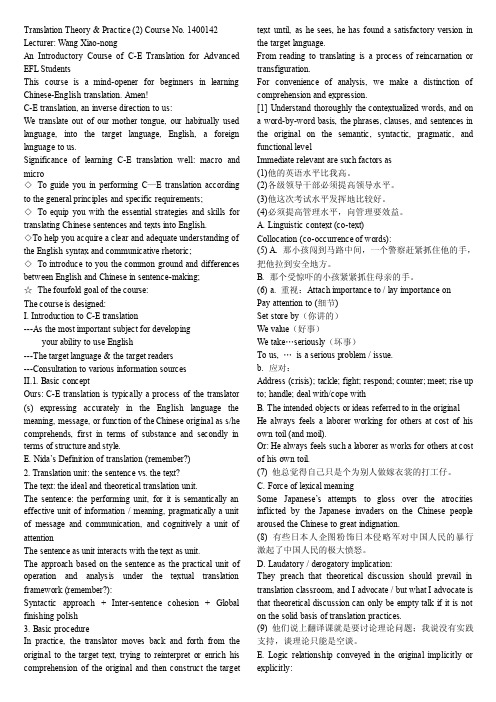
Translation Theory & Practice (2) Course No. 1400142 Lecturer: Wang Xiao-nongAn Introductory Course of C-E Translation for Advanced EFL StudentsThis course is a mind-opener for beginners in learning Chinese-English translation. Amen!C-E translation, an inverse direction to us:We translate out of our mother tongue, our habitually used language, into the target language, English, a foreign language to us.Significance of learning C-E translation well: macro and micro◇To guide you in performing C—E translation according to the general principles and specific requirements;◇To equip you with the essential strategies and skills for translating Chinese sentences and texts into English.◇To help you acquire a clear and adequate understanding of the English syntax and communicative rhetoric;◇To introduce to you the common ground and differences between English and Chinese in sentence-making;☆The fourfold goal of the course:The course is designed:I. Introduction to C-E translation---As the most important subject for developingyour ability to use English---The target language & the target readers---Consultation to various information sourcesII.1. Basic conceptOurs: C-E translation is typically a process of the translator (s) expressing accurately in the English language the meaning, message, or function of the Chinese original as s/he comprehends, first in terms of substance and secondly in terms of structure and style.E. Nida’s Definition of translatio n (remember?)2. Translation unit: the sentence vs. the text?The text: the ideal and theoretical translation unit.The sentence: the performing unit, for it is semantically an effective unit of information / meaning, pragmatically a unit of message and communication, and cognitively a unit of attentionThe sentence as unit interacts with the text as unit.The approach based on the sentence as the practical unit of operation and analysis under the textual translation framework (remember?):Syntactic approach + Inter-sentence cohesion + Global finishing polish3. Basic procedureIn practice, the translator moves back and forth from the original to the target text, trying to reinterpret or enrich his comprehension of the original and then construct the target text until, as he sees, he has found a satisfactory version in the target language.From reading to translating is a process of reincarnation or transfiguration.For convenience of analysis, we make a distinction of comprehension and expression.[1] Understand thoroughly the contextualized words, and ona word-by-word basis, the phrases, clauses, and sentences in the original on the semantic, syntactic, pragmatic, and functional levelImmediate relevant are such factors as(1)他的英语水平比我高。
(完整版)新视野大学英语读写教程4(第二版)课后习题答案

Unit 1III。
1。
idle 2。
justify 3。
discount 4。
distinct 5. minute 6。
accused 7。
object 8. contaminate 9. sustain 10。
worshipIV。
1. accusing。
. of2. end up3. came upon 4。
at her worst5. pa:6. run a risk of 7。
participate in 8。
other than 9。
object to/objectedV1。
K 2。
G 3. C 4。
E 5. N 6。
0 7.1 8. L 9。
A 10。
D CollocationVI。
1。
delay 2. pain 3. hardship 4。
suffering 5。
fever6. defeat 7。
poverty 8。
treatment 9。
noise 10. agony Word buildingVII.1。
justify 2. glorify 3. exemplifies 4。
classified5. purified6. intensify7. identify 8。
terrifiedVIII。
1. bravery2. jewelry 3。
delivery 4。
machinery5. robbery 6。
nursery 7. scenery 8。
discoverysentence StructureIX.1. other than for funerals and weddings2. other than to live an independent life3. other than that they appealed to his eye . 。
`4. but other than that,he’ll eat just about everything 。
4)翻译技巧(英语)

4)翻译技巧(英语)Translation strategies:1. foreignization / alienization (foreignizing method)异化/洋化and domestication/ adaptation (domesticating method)归化Foreignization: If the translator’s preference is placed on preserving the language and cultural differences of the Source Text, we call this kind of approaches or its translation foreignizing or foreignization, or alienization.Domestication: It refers the method or practice of adapting the translation to the norms and values of the Target Language and culture is called domesticating, or domestication, or adaptation.For example,C-E谋事在⼈,成事在天。
Man proposes, Heaven disposes. (Yang: 90)Man proposes, God disposes. (Hawkes: 152)注:杨宪益利⽤了⼀个英语谚语,但把其中的“God”改成了“Heaven”,从⽽保留了原有的宗教⾊彩。
⽽Hawkes直接引⽤了英语谚语,未作任何改动,这样,他把原⽂的佛教⾊彩变成了基督教⾊彩。
这样英美读者更为⾃然、更容易接受。
当然,这样⼀来,Hawkes(霍⾦斯)把⼀个信佛的⼈变成了⼀个信耶稣的⼈了。
4 chapter 5 产品说明书汉英翻译
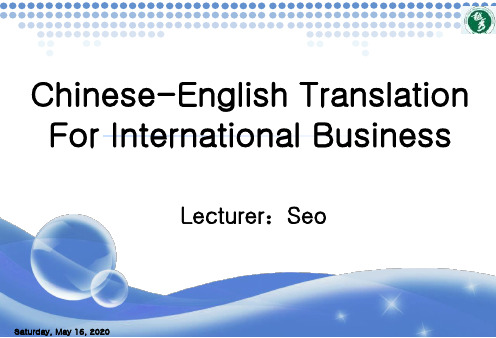
Contents of Lecture Four
Part 1 Introduction of Instruction Manual Part 2 Translation of Instruction Manual Part 3 Assignment
Sunday, November 21, 2010
chineseenglishtranslationforinternationalbusinesscontentsoflecturefourpart1introductionofinstructionmanualpart2translationofinstructionmanualpart3assignment产品说明书的语言特征客观性产品说明书主要面对普通消费大众阐述产品性能特点等所以说明书的内容必须通俗易懂实事求是对产品进行客观的描述
Sunday, November 21, 2010
English College
(5)名词+过去分词 5 阀杆弯曲. . bent. The stem bent. (6)祈使句 6 请勿拆装本机或尝试执行本说明手册中未述及的程序。 Do not disassemble this machine or attempt any procedures not described in this manual. (7)省略句 7 禁忌症:尚未发现。 Contraindications: None Known
Sunday, November 21, 2010
English College
5. 全新妮唯雅美白泡沫面乳令肌肤享受澄净清新地感觉 ,配合妮维雅多重美白系列其他产品地使用可获得更为 有效地美白效果。蕴含纯净美白因子地温和配方令肌肤 澄净白皙。 NEW NIVEA VISAGE Whitening Foam instantly cleanses the skin, while supporting the whitening effect of the following NIVEA VISAGE Multiple White products. The gentle formula with White Pure Active encourages a clear, fair complexion.
lecture 5 汉英词语翻译
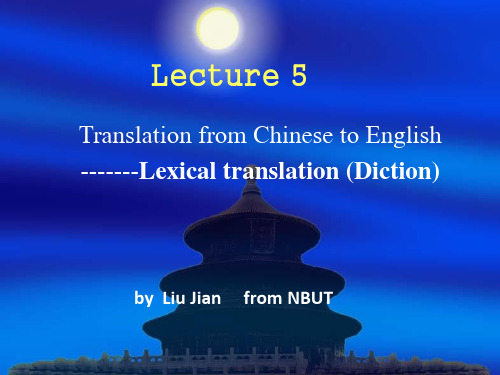
7). 昨天看电影我没有买到好票:
* I did not buy a good ticket for yesterday’s film. I did not buy a good seat for yesterday’s film.
8). 这所全国重点大学为社会输送了大批人才
(batches of )。 * The national heavy university has sent/transported batches of qualified talents to the society. The national key university has prepared batches of qualified graduates for the society. 9). 他们省吃俭用,为的是攒钱买房子。 * They save food and expenses to accumulate more funds to buy an apartment. They live frugally/economically/thriftily to accumulate more funds to buy an apartment.
Appropriateness in word selection-ii
To choose word according to the collocation 2). 好: 好教徒 好父母 好儿女 好妻子 好丈夫 3). 水平: 英语水平 生活水平 游泳水平
2) good a faithful/devout/pious/sincere/ devoted Christian/believer a loving/caring parent an obedient/filial child a virtuous/devoted wife a dutiful/responsible husband 3) level English proficiency/ level living standard swimming skill
英汉互译Lecture 1 (5)
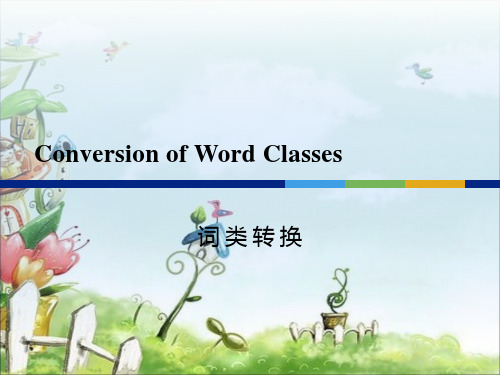
3. Conversion into adjectives
1) I have difficulty in speaking Putonghua. (Nouns) 讲普通话我很困难 困难。 困难 2)Her questions suggested her innocence. (Nouns) 她提出的问题表明她是无知的 无知的。 无知的 3) Independent thinking is an absolute necessity in study. (Nouns) 独立思考对学习是绝对必需的 必需的。 必需的
5. Conversion of Sentence Elements
1) His clear, concise explanation made the audience greatly convinced. 他的解释清楚明白 清楚明白,令听众大为信服。 清楚明白 2) This sort of stone has a relative density of 2.7 这种石头的相对密度是2.7(from the object to the subject) 3)Care must be taken at all times to protect the instrument from dust and damp. 应当始终注意保护仪器,不使其沾染灰尘和受潮 (from the subject to thf Word Classes
词类转换
Conversion of Word Classes
I. Definition II. Conversion in E-C Translation III. Conversion in C-E Translation IV. Assignments
Translation 演示文稿

• American Heritage D • Merrian-Webster • Collin Cobuild
• Family: children • E.g.
– Couples with young families wouldn't want to live here. – They're getting married next year, and hope to start a family (=have children) straight away.
Good Mastery of English
• • • • • 1. Do you have a family? 你有孩子吗? 2. Her mother died of difficult labor. 她的妈妈死于难产。 3 Evolution is a conservative process, wasting little of value. • 物质的进化是一个极其缓慢的过程,物质 在短时间内不会起质的变化。
What are we going to learn?
• Lecture 1 ——Introduction to the Course and Basic concepts in Translation • Lecture 2 ——Translation Skill :Diction (I) • Lecture 3 ——Translation Skill :Diction (II) • Lecture 4 ——Translation Skill :Diction (III) • Lecture 5 ——Translation Skill :Diction (IV) • Lecture 6 ——Translation Skill: Amplification • Lecture 7 ——Translation Skill: Extension • Lecture 8 ——Translation Skill: Negation
英语四级听力分值分配
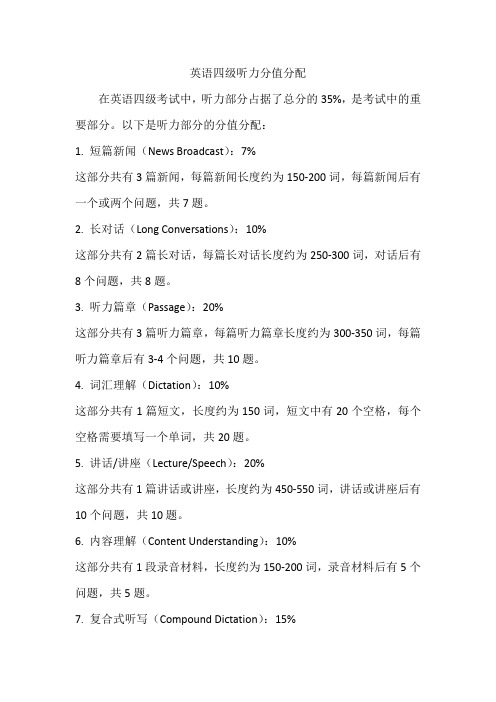
英语四级听力分值分配在英语四级考试中,听力部分占据了总分的35%,是考试中的重要部分。
以下是听力部分的分值分配:1. 短篇新闻(News Broadcast):7%这部分共有3篇新闻,每篇新闻长度约为150-200词,每篇新闻后有一个或两个问题,共7题。
2. 长对话(Long Conversations):10%这部分共有2篇长对话,每篇长对话长度约为250-300词,对话后有8个问题,共8题。
3. 听力篇章(Passage):20%这部分共有3篇听力篇章,每篇听力篇章长度约为300-350词,每篇听力篇章后有3-4个问题,共10题。
4. 词汇理解(Dictation):10%这部分共有1篇短文,长度约为150词,短文中有20个空格,每个空格需要填写一个单词,共20题。
5. 讲话/讲座(Lecture/Speech):20%这部分共有1篇讲话或讲座,长度约为450-550词,讲话或讲座后有10个问题,共10题。
6. 内容理解(Content Understanding):10%这部分共有1段录音材料,长度约为150-200词,录音材料后有5个问题,共5题。
7. 复合式听写(Compound Dictation):15%这部分共有1段短文,长度约为200-250词,短文中有10个空格,每个空格需要填写一个单词或短语,共10题。
8. 句子听写(Sentence Dictation):5%这部分共有1段录音材料,长度约为70-80词,录音材料后有4个问题,共4题。
9. 听译(Translation):5%这部分共有1段录音材料,长度约为70-80词,录音材料后有4个句子需要翻译成英文,共4题。
总结:以上是英语四级听力分值分配的详细说明,总共分为9个部分。
学术英语(理工)详解答案-Unit-1

Genetic engineering
– If the topic is too general, how do you narrow it down to a more manageable topic?
Universe
– Can you suggest some
appropriate topics of each
In which aspect do the two essays share the same idea? Both focus on the vulnerability of a computer.
9
Unit 1 Choosing a Topic
1 Deciding on a topic
In which aspect do the two essays differ?
U.S. Dollars. 16 __e_x_p_lo_i_t ___ (开拓) a new market in the city 17 be absorbed in the social _n_e_t_w_o_r_k_in_g_ (社交网络) 18 __i_n_v_o_lv_e___ (涉及) unnecessary extra charges 19 only one __in_s_t_a_n_ce___ (实例) out of many 20 get to know more about the _s_p_e_c_ifi_c_a_ti_o_n (具体的细节) of
Lecture 1 Questions Lecture 2 Questions Lecture 3 Questions
4
Unit 1 Choosing a Topic
1 Deciding on a topic
新视野大学英语第2版第2册答案(完整版)
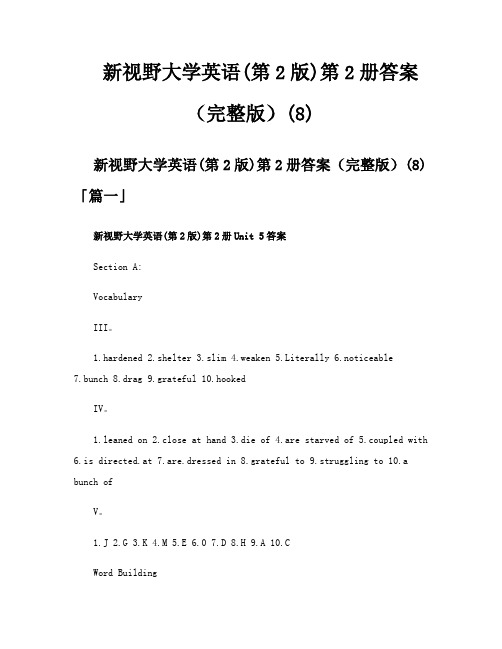
新视野大学英语(第2版)第2册答案(完整版)(8)新视野大学英语(第2版)第2册答案(完整版)(8)「篇一」新视野大学英语(第2版)第2册Unit 5答案Section A:VocabularyIII。
1.hardened2.shelter3.slim4.weaken5.Literally6.noticeable7.bunch 8.drag 9.grateful 10.hookedIV。
1.leaned on2.close at hand3.die of4.are starved of5.coupled with6.is directed.at7.are.dressed in8.grateful to9.struggling to 10.a bunch ofV。
1.J2.G3.K4.M5.E6.07.D8.H9.A 10.CWord Building1.Under the pleasant situation the property prices are just beginning to harden again。
2.In the past few years,these inside conflicts have weakened the government's position。
3.Every Sunday the father takes his child to libraries, museums,exhibitions or natural parks,as he believes that this helps to broaden the child's mind。
4.The days are lengthening as summer approaches。
5.As she was waiting for the result to come out,her excitement heightened。
新编大学英语(第四版)视听说教程3教学课件U5
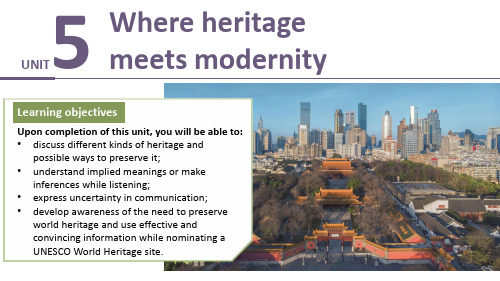
Listening and understanding
11 Two friends are waiting for a performance of Shakespeare to begin. Before the curtain rises, they are having a conversation about Shakespeare. Now listen to the conversation and find out the meanings of the expressions from Shakespeare’s works.
Listening & speaking
Conversation
Listening and understanding
1
Scripts
Questions: 1. What did the woman think the man did before the play? 2. What was the color green most commonly associated with before Shakespeare’s
Conversation
SLPiEsAtKeINnGinTIPgSand speakingHale Waihona Puke SPEAKING TIPS
1
Expressing uncertainty There are occasions when we are not sure about what is being said in oral communication. Therefore, it is important to know some common ways of expressing uncertainty.
英汉翻译学习Lesson4
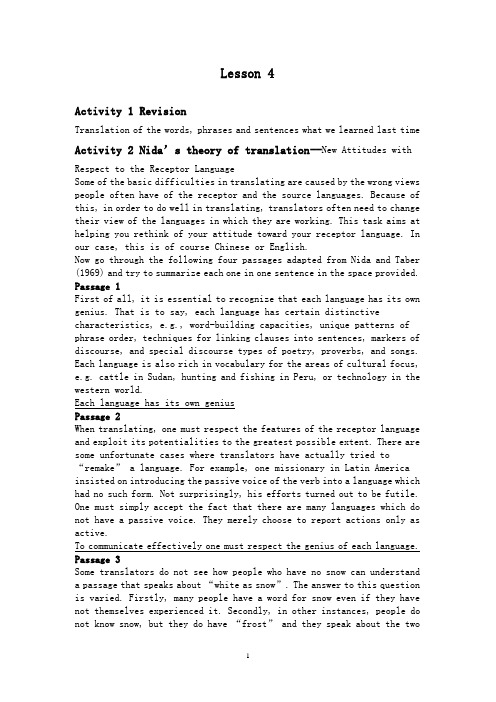
Lesson 4Activity 1 RevisionTranslation of the words, phrases and sentences what we learned last time Activity 2 Nida’s theory of translation--New Attitudes withRespect to the Receptor LanguageSome of the basic difficulties in translating are caused by the wrong views people often have of the receptor and the source languages. Because of this, in order to do well in translating, translators often need to change their view of the languages in which they are working. This task aims at helping you rethink of your attitude toward your receptor language. In our case, this is of course Chinese or English.Now go through the following four passages adapted from Nida and Taber (1969) and try to summarize each one in one sentence in the space provided. Passage 1First of all, it is essential to recognize that each language has its own genius. That is to say, each language has certain distinctive characteristics, e.g., word-building capacities, unique patterns of phrase order, techniques for linking clauses into sentences, markers of discourse, and special discourse types of poetry, proverbs, and songs. Each language is also rich in vocabulary for the areas of cultural focus, e.g. cattle in Sudan, hunting and fishing in Peru, or technology in the western world.Each language has its own geniusPassage 2When translating, one must respect the features of the receptor language and exploit its potentialities to the greatest possible extent. There are some unfortunate cases where translators have actually tried to “remake” a language. For example, one missionary in Latin America insisted on introducing the passive voice of the verb into a language which had no such form. Not surprisingly, his efforts turned out to be futile. One must simply accept the fact that there are many languages which do not have a passive voice. They merely choose to report actions only as active.To communicate effectively one must respect the genius of each language. Passage 3Some translators do not see how people who have no snow can understand a passage that speaks about “white as snow”. The answer to this question is varied. Firstly, many people have a word for snow even if they have not themselves experienced it. Secondly, in other instances, people do not know snow, but they do have “frost” and they speak about the twowith the same term. Thirdly, many languages have other equivalent idioms, e.g., “white as egret(白鹭) feathers”, or “white as fungus (菌类, 蘑菇)” (if there is an especially white form of fungus). The point is that snow as an object is not crucial to the original message. Of course if the form in which a message is expressed is an essential element of the message itself, then there is a limitation in communicating the message from one language to another.Anything that can be said in one language can be said in another, unless the form is an essential element of the message.Passage 4Since all languages differ in form, quite naturally the forms must be changed if one is to preserve the content. The extent to which the forms must be changed in order to preserve the meaning depends on the linguistic and cultural distance between the source and receptor languages. The easiest transitions occur when one translates from a language such as English into German for the two are quite similar to each other both linguistically and culturally. On the other hand, if one is translating from English into Hungarian, the formal shifts will be greater, for Hungarian belongs to a different language family than English. However, Hungarian is still part of the same cultural setting as English. Hence, the shifts are not so extreme. If however, one has to translate from English into Zulu, which belongs t the so-called Bantu family of languages and represents quite a different culture, the formal modifications must be more extreme.To preserve the content of the message the form must be changed. Naturally, a new attitude towards the receptor language implies a new view of the source language as well. We don’t have to go into the great details in this respect, for there are a lot of similarities between the attitude concerning the receptor language and that concerning the source language. It suffices (vi.足够, 有能力vt.使满足) our purpose to bear in mind the following three implications with respect to the source language. (1) The source language is subject to the same limitations as any other natural language; (2) the writers of the source language expect to be understood; and (3) the translator must attempt to reproduce the meaning of a passage as understood by the writer.Activity 3 Languages Differ: Differences in Clause OrderWe have done some serious thinking about the nature of translating. Well, to be a good translator, only serious thinking is not enough. We should also practice as hard as we can and as much as we can. In this activity, we shift our attention to examining the differences in clause order between English and Chinese and the impact this has on our translating. In Chinese, we say就要毕业的学生们仍在教室里学习 while in English the same meaning is presented as Those students who were to graduate very soonwere still studying in the classroom. In the Chinese sentence, the attributive就要毕业的 is placed before 学生们 and the adverbial 在教室里 is placed before 学习, while in the English sentence, the attributive who were to graduate very soon is put after those students and the adverbial in the classroom is put after studying.Task 1 Where to Put the AttributiveQuestions:1.In Chinese, where is an attributive put?2.In English, where is an attributive put?3.Is there a difference between the word attributive and phraseattributive concerning their positions in a sentence?(Both in English and Chinese)In English, when a word is used as an attributive to modify a noun, it is usually placed before the noun, though on some rare occasions it can also be placed after noun. In Chinese an attributive is almost always put before the noun it modifies.Now translate the following phrases into Chinese, paying special attention to the positions of the attributives.1.a well-managed company 一家管理完善的公司2.the architect’s luxurious house 建筑师的豪华住宅3.the ancient Chinese philosophers 中国古代的哲学家们4.something urgent 紧急的事情5.somewhere unknown 不为人所知的某个地方Of course, not only can single words serve as attributives, but short phrases as well. In English, when a short phrase is used as an attributive to modify a noun, it is usually placed after the noun, while in Chinese it is usually put before the noun.Now translate the following items into Chinese, again paying special attention to the positions of the attributives.1.a project of building up the first corpus of spoken Chinese in China (创立中国第一个汉语口语语料库的项目)2.a student with a lot of complaints for the university(一个对学校颇多抱怨的学生)3.particles moving round their atomic nucleus(环绕原子核运动的粒子)4.a machine able to recognize human voice(能识别人的声音的机器)5.a girl wearing a long white dress(穿着白色长裙的姑娘)6.a book easy to read(一本容易读的书)Read the textbook P23-24Conclusion: Usually in English, the word attributive is put before the noun, and the phrase attributive is put after the noun, but in Chinese, it is almost always for attributives to be put before the noun.Task 2 Where to Put the Adverbial1.In Chinese, where is an adverbial put?2.In English, where is an adverbial put?3.Is there a difference between the word adverbial which modifies an adjective and the word adverbial which modifies a verb concerning their positions in a sentence?(Both in English and Chinese)Now translate the following sentences into Chinese or English, paying special attention to the positions of the adverbials.1.She was not particularly beautiful, but she certainly left a deepimpression on everybody.(她并不是特别地美丽,但她显然给每个人都留下了深刻的印象。
翻译专业英语综合能力强化:理解与表达知到章节答案智慧树2023年北京第二外国语学院
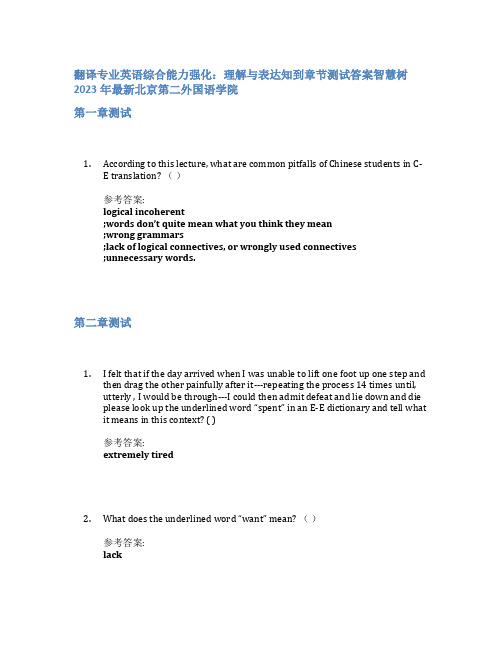
翻译专业英语综合能力强化:理解与表达知到章节测试答案智慧树2023年最新北京第二外国语学院第一章测试1.According to this lecture, what are common pitfalls of Chinese students in C-E translation? ()参考答案:logical incoherent;words don’t quite mean what you think they mean;wrong grammars;lack of logical connectives, or wrongly used connectives;unnecessary words.第二章测试1.I felt that if the day arrived when I was unable to lift one foot up one step andthen drag the other painfully after it---repeating the process 14 times until,utterly , I would be through---I could then admit defeat and lie down and die please look up the underlined word “spent” in an E-E dictionary and tell what it means in this context? ( )参考答案:extremely tired2.What does the underlined word “want” mean? ()参考答案:lack3.Which Chinese version of the underlined word do you think is the best?My purpose in writing you is to by considering exactly what your grademeans and doesn’t mean. ()参考答案:理性地看待失败4.我最近长胖了许多。
diction
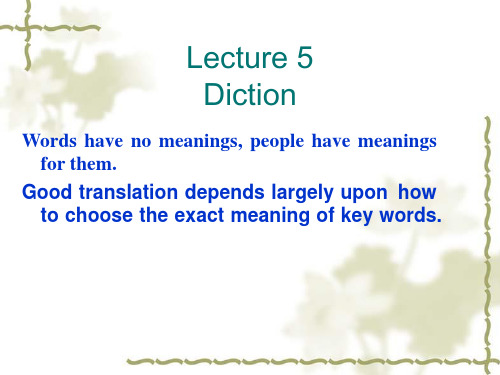
4)…yet, as it sometimes happens that a person departs his life, who is really deserving of the praises the stone-cutter carves over his bones; who is a good Christian, a good wife or a good husband; who actually does have a disconsolate family to mourn his loss;…(W. M. Thackeray : Vanity Fair) ……不过偶尔也有几个死人当得起石匠刻在他 们朽骨上的好话。真的是虔诚的教徒,慈爱的父 母,孝顺的女儿,贤良的妻子,尽职的丈夫,他 们家里的人也的确哀思绵绵的追悼他们;……
The communist agents are still after our military information/ messages. Increasing contact with the West will make their job much easier. 甲: 这是一点小意思,请务必收下. 乙: 你这人真有意思,怎么也来这一套? 甲: 只是意思意思罢了. 乙: 那就不好意思了. A: It is a little gift as a token of my gratitude. Please do take it. B: Aren’t you a little bit too polite? A: Ah, It carries/ conveys my gratitude and affection only. B: Oh, thanks a lot, although I really don’t deserve it.
Lecture 5
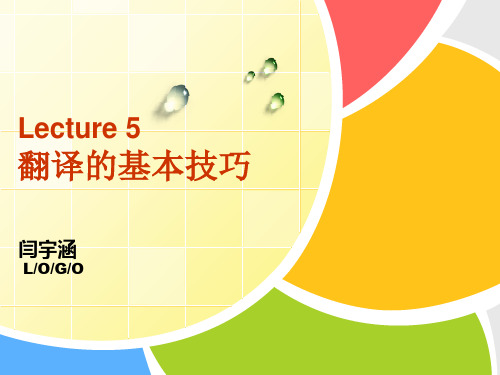
4、others
• One should be psychologically as well as physically sound.
Please have a try!
• An acquaintance of world history is helpful to the study of current affairs.
• 熟悉一些世界史有助于学习时事。 • He urged upon citizens of the country the necessity of persisting in participation in political controversies. • 他告诫全国人民,必须坚持参加政治论战。
• 老年人什么都相信;中年人什么都怀疑;青年人 什么都懂。 • Under given condition, the harmful can be transformed into the beneficial. • 在一定条件下,坏事可以变成好事。
3、n → adj
• I recognized the absurdity of dealing with them through intermediaries. • 我认识到通过中间人跟他们打交道是愚蠢的。
Lecture 5
翻译的基本技巧
闫宇涵
L/O/G/O
翻译的基本技巧
• • • • • 转性与变态 增补与省略 正译与反译 抽象与具体 分句与合句
Lecture5

4.3. Skopos Theory
Six Rules of Translation:
1.A translatum (or TT) is determined by its
skopos; 2. A TT is an offer of information in a target culture and TL concerning an offer of information in a source culture and SL. 3. A TT does not initiate an offer of information in a clearly reversible way.
4.2. Translational Action
Interlingual transaltion is described as
„translational action from a source text” and as a communicative process involving a series of roles and players:
Operative
Appellative(ma king appeal to text receiver
Dialogue Appellativefocused
Language Dimension Text Focus TT should Translation method
Transmit Elicit desired aesthetic form response Identifying Adaptive method, adopt equivalent perspective of effect ST author
Translation-of-Words-(II)分析
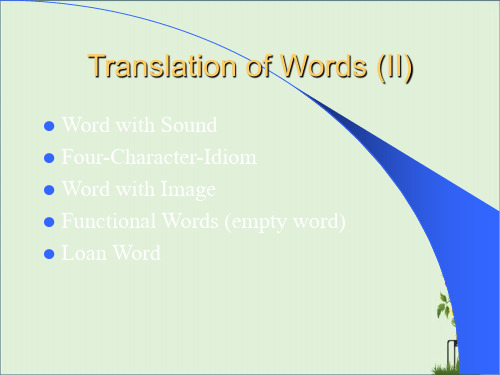
Word with Sound VII
5)小孩哭着睡着了。 6)她笑骂道“该死的,吓死我了,我还当是闹鬼了呢”。 7)老板厉声说道“你昏了头了,教训起我来了。 8) 一到雨天,四周的居民就得踏着泥泞买菜。 5)After a while, the whimpering baby fell asleep. 6)She cursed him, giggling, “Damn you, what fright you gave me. I
Word with Sound III
1) Transliteration---a new word with sound is created in TL.
2) Addition---word with sound used to render normal words.
3) Deletion---words with sound in SL deleted.
3)天气这样闷热,十之八九要下雨。With the weather so close and stuffy, ten to one it will rain presently.
Four ห้องสมุดไป่ตู้haracter Idioms VII
Four Character Idioms III
1)天长地久;轻如鸿毛; 挥金如土;山穷水尽;孤注 一掷; 半斤八两; 格格不入; 泰然自假设; 旁观者 清.
2)适者生存,优胜劣汰; 货到付款; 出类拔萃; 公正竞争; 脱贫致富; 易如反掌; 忍气吞声
3)求同存异; 能者多劳; 人为财死,鸟为食亡; 公正合理;隔墙有耳, 彻头彻尾; 患难与共, 软硬 兼施
Translation of Words (II)
Conversion_(1)英译汉_08-4
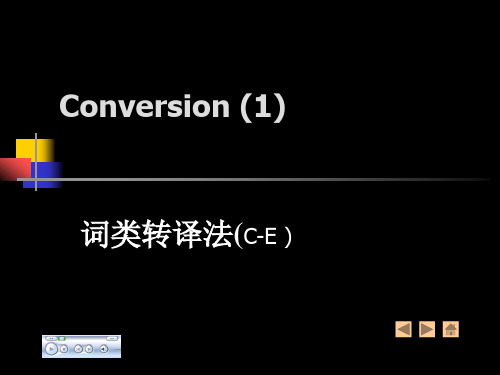
这些问题难以归类。
The adoption of this new device will greatly cut down the percentage of defective products.
只有研究这些材料的特性才能更好地利 用它们。
2) Nouns and Verbs Converted Into Adverbs
I have the honor to inform you that your request is granted.
我荣幸地通知您,您的请求已得到批准。
The new mayor earned some appreciation by the courtesy of coming to visit the city poor.
sound. 他身体虽弱,但思想健康。
4. Conversion into Adverbs
1) Adjectives Converted Into Adverbs
A helicopter is free to almost anywhere. 直升飞机几乎可以自由地飞往任何地方。
Only when we study their properties can we make better use of the materials.
采用这种新装置可大大地降低废品率。
说明:在翻译时抽象名词adoption就译为汉 语动词“采用”,取代 “to adopt this new device”。
翻译案例对比分析
Every thing I do has to be my decision,and that gives me the responsibility of handling my own life.
- 1、下载文档前请自行甄别文档内容的完整性,平台不提供额外的编辑、内容补充、找答案等附加服务。
- 2、"仅部分预览"的文档,不可在线预览部分如存在完整性等问题,可反馈申请退款(可完整预览的文档不适用该条件!)。
- 3、如文档侵犯您的权益,请联系客服反馈,我们会尽快为您处理(人工客服工作时间:9:00-18:30)。
Homework
• 1. 你真是福星高照。 You have a lucky star above you. • 2. 我不想依靠父母过日子。 I don’t want to hang on my parents’ sleeves. • 3. 今天下午的球赛,棋逢对手,一定很精彩。 This afternoon’s ball game is sure to be an exciting one, for the two sides are well-matched.
Exercises
• Do Ex 7(3) on Page 84.
Translation of Chinese Idioms
• 1. Features of Chinese Idioms • 言简意赅、生动形象、音韵和谐、常用 典故、语义具有整体性 • e.g. • 声东击西、口蜜腹剑、毛遂自荐、天长 地久、叶公好龙、八仙过海……
• 在那里,古树摇曳春秋,山花自开自谢, 植被茸茸生烟……(“神话世界九寨 沟”) • Aged trees wave the seasons by, amid carpets of wild flowers and thick green vegetation.
• 我们要培养出适应社会主义现代化建设需要的 一代“四有新人”。 • We must bring forth a new generation of well-educated and self-disciplined people with lofty ideals and moral integrity, such as are necessary for our socialist modernization drive.
• • • • • •
井底之蛙 to be like a frog at the bottom of a well 口蜜腹剑 to be honey-mouthed and dagger-hearted 牢不可破 to be so strongly built as to be indestructible • 史无前例 • to be without precedent in history
Translation of Fourcharacter Phrases
• 1. Features of Four-character Phrases • 字数统一,音节固定,结构工整,音韵和 谐,简洁明快,讲究结构的对仗和文采的 华丽,词义虚实杂糅,繁复重叠。 • e.g. • 质地优良,选料考究,开拓进取,敬请光 临,工业园区……
• 2. Translation Strategies of Fourcharacter Phrases
• 能够直译尽量直译,但如果直译不通或 有损于原文风格时,应舍弃原文的形式, 从内容入手,做到意义相符、功能相似。
• 3. Examples
• 我厂生产的地毯图案新颖、色调雅致、 美丽大方、富丽堂皇。 • The carpets made in our factory are beautiful and magnificent for their novel designs and elegant colors.
• 4. 只是晚上躺在床上的时候,她才感到 神志清醒。 It’s only during the night when she lies in bed that she feels she has a clear mind. • 5. 这家电视机真是价廉物美。 This television set is really fine and inexpensive.
Translation Methods of Chinese Idioms
• • • • • 1. Literal Translation e.g. 声东击西 to shout in the east and strike in the west to make a feint to the east and attack in the west • 刻骨铭心 • to be engraved on one’s heart and bones • to remember to the end of one's life
• 中国外交人员应当立场坚定、目光远大、 头脑敏捷、业务熟练、才华出众、风格 高尚。 • A Chinese diplomat should be firm in stand, broad in vision, swift in wit, qualified in profession, outstanding in talent and noble in character.
• 穷棒子闹翻身,是八仙过海,各显其 能…… • The way we poor folks try to emancipate ourselves, is just like the way the Eight Fairies crossed the sea each displaying his own talent…… • Note: The Eight Fairies refer to the eight immortals of Taoism in Chinese folklore.
• • • • • • • •
毛遂自荐 to volunteer one’s service 初出茅庐 at the beginning of one’s career 倾国倾城 to be exceedingly beautiful 悬梁刺股 to be extremely hard-working in one’s study
• 该厂生产的各种类型钻头均符合API标准,工 艺先进、结构新颖、钢材优质、制造精细、质 检严格,均已达到国内同类钻头的先进水平。 • Bits of all types manufactured in the factory conform to the API Standards. With novel design and fine workmanship, they are made of quality steel in advanced technology. All the products have passed strict quality test and reached in all respects the advanced level of the domestically-made bits of the kind.
• • • • • • • •
2. Liberal Translation e.g. 粗枝大叶 to be crude and careless 无孔不入 to take advantage of every weakness 单枪匹马 to be single-handed in doing sth.
• • • • • •
水中捞月 to fish in the air 弱不禁风 as weak as water 格格不入 a square peg in a round hole
• 4. Literal Translation + Notes • e.g. • 嘴里天天说,“唤起民众”,民众起来了又害 怕得要死,这和叶公好龙有什么两样? • If one shouts everyday about “arousing the masses of the people”, but is scared to death when the people do rise, what is the difference between that and Lord Ye’s love of dragon? • Note: Lord Ye was so fond of dragons that he adorned his whole palace with drawings and carvings of them. But when a real dragon heard of his affection and paid him a visit, he was frightened out of his wits.
• • • •
• • • •
3. Equivalent English Idioms e.g. 竭泽而渔 to kill the goose that lays the golden eggs 打草惊蛇 to wake a sleeping dog 天长地久 as old as the hills
Exercise
• Do Ex. 7 on Page 83.
Homework
• • • • • • • Translation 1. Four-character Phrases 货到付款、扭亏为盈、投资热点、脱贫致富 2. Chinese Idioms 攻其不备(直译) 海阔天空(意译) 洗心革面(套译)
